About 100km away from Seoul is ‘Cambodia’. A mushroom farm in Asan, South Chungcheong Province. Except for the Korean CEO, all 12 employees are Cambodian. I work using the Cambodian language and eat Cambodian food to gain strength. They grow the king oyster mushrooms and oyster mushrooms that are on our tables. I decided to throw myself into the scene. I was going to spend two days and one night as an inexperienced ‘Korean worker’.
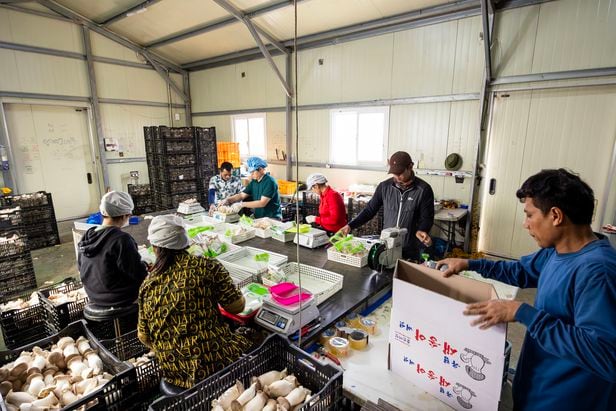 |
| On the 23rd of last month, Cambodian employees are packaging harvested king oyster mushrooms at a mushroom farm in Asan, South Chungcheong Province. Among them, one Korean reporter is experiencing the field. Where is he? /Lee Geon-song, video media reporter |
9 a.m. on the 22nd of last month. I left the highway and continued on for about 10 more kilometers, winding between forests and rice fields. Just when I was wondering if I had entered a remote place by mistake, I saw a sign for a mushroom farm. There were warehouse-type buildings with yellow walls and blue roofs lined up on about 10,000 m2 (3,000 pyeong) of land. Crunch, squeak... . I could hear the sound of the machine running.
The most heard words: “It’s okay.”
“Jjumlip sign language!” This is a greeting I learned from watching Cambodian conversation YouTube videos. Senior Cambodians had been working since early morning. He awkwardly placed his joined hands under his nose and lowered his head. Those people who were squinting at the reporter's unnatural pronunciation soon smiled brightly as if they understood. People born between 1984 and 1995 are said to be the 2030 generation.
It felt more like a factory than a farm. Using a forklift, pour sawdust, fertilizer, etc. into a box the size of a dump truck bed. A large whirlpool blade rotates to mix the mixture, and this is the ‘medium’, the soil for growing mushrooms. If you place a 1L bottle on the conveyor belt, the badge will be placed automatically. They make 7,200 bottles like this a day. Inoculate mushrooms such as king oysters and oysters here and wait for a month. Each bottle produces 1,000 kg of mature mushrooms every day. It is sold straight to supermarkets and markets.
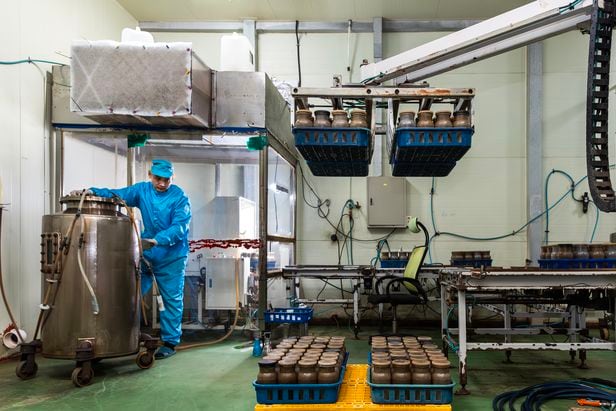 |
| Kim Leng, an employee from Cambodia, is inoculating new mushrooms into each bottle containing medium. The cylindrical metal container on the left contains mushroom culture, which is inoculated into bottles through a conveyor belt machine. /Lee Geon-song, video media reporter |
It took nearly 10 complicated procedures to grow and package the mushrooms. He brought new bottles into the mushroom warehouse, thinned out only the sturdy mushrooms, and harvested the mature mushrooms. Unlike my seniors who followed each procedure smoothly, I made mistakes time and time again. Every time, the answer was “It’s okay.”
One basket containing mushroom bottles weighs 14 kg. While trying to stack several baskets at once, I made the mistake of dropping a bottle. Cambodian seniors said, “It’s okay.” Up to 10 to 20 small mushrooms grow in one bottle. I had to thin it out with a knife, leaving only two strong mushrooms, but I cut off the healthy mushrooms. "are you okay." A workplace that is so tolerant of mistakes. Wasn’t it a privilege he received as a ‘Korean worker’ in Cambodia? It would have been impossible to be a 'Cambodian worker' among Koreans.
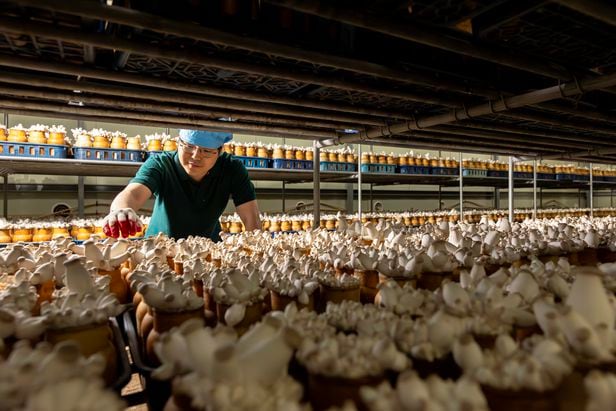 |
| Reporter Jang Geun-wook is working on thinning king oyster mushrooms. /Lee Geon-song, video media reporter |
Their workplace, the ‘Mushroom Warehouse,’ was dark, dark, and damp. The temperature was cool at 14 to 17 degrees Celsius in the dim blue lighting that mushrooms love. The humidity was maintained at 80-90%, and it felt like water was being sprayed every moment. It's like a slightly less cold 'refrigerator'. In Cambodia, the lowest temperature is around 15 degrees even in the cold winter. Wouldn't it be cold? The answer this time was “It’s okay.”
Dinner dinner is ‘Cambodian style’
Work wasn't finished until after 7pm that evening. The work time was 5pm, but the task of thinning mushrooms was slow. You get paid the more you work. Cambodian employees gathered at a restaurant on one side of the farm. I started grilling pork belly on the grill. It was a company dinner. Freshly harvested mushrooms were grilled and served with aged kimchi. We poured soju and beer into cups and said “cheers.”
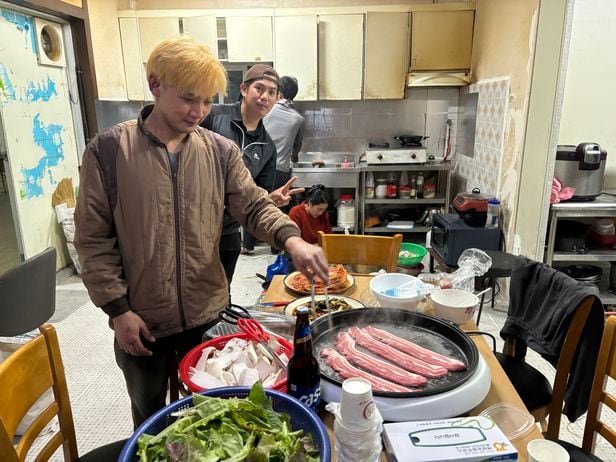 |
 |
What was surprising was the scenery that followed. Employees placed their cell phones on one side of the table and made video calls with their families remaining in their hometown, Cambodia. I ate and did kitchen work with the speaker phone turned up loudly. The three-year-old daughter of Mr. Prot (38), who is in charge of the work crew, was upset over a video call. She said her dad, who went home a year ago, doesn't come home often. “Dad, have you got a girlfriend?” It was to be done. The Cambodian people all burst into laughter. This eatery was the closest place to the family I left behind in Cambodia.
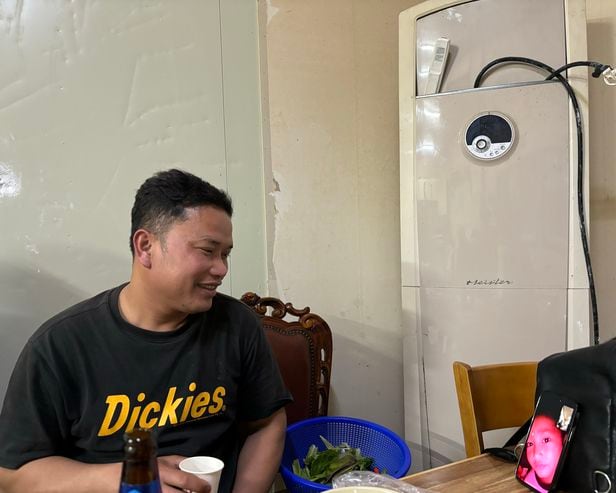 |
| On the evening of the 22nd, Mr. Prot is smiling while making a video call with his daughter in his home country, Cambodia, after finishing work at the mushroom farm. /Reporter Jang Geun-wook He grabbed me and asked, “Do you no Cambodia (Do you know Cambodia)?” Question time followed. First, chicken soup made with fermented lemon was placed. The taste was so refreshing that I couldn't help but smile. Everyone was happy. Next was 'Samro Kakko', a thick stew made with fish and vegetables. I was told that it was “Cambodian national food, similar to Korea’s kimchi stew.” The images of miners and nurses in Germany from 50 to 60 years ago overlapped. When they eat steak, they also probably look for kimchi stew. The next morning dawned. The reporter slept in a sleeping bag in one corner of the office. His shoulders slumped. However, I jumped up at the sound of people coming from outside. Cambodian employees live in three nearby rental apartments. At 7:30 a.m., breakfast was in full swing at the restaurant where we had dinner yesterday. It was a ‘donburbap’ where rice was placed in a wide bowl and topped with Cambodian soup. Departure time is 8 am. Another mushroom was waiting for us. Like the miners and nurses dispatched to Germany in the 1960sThe reason Cambodian employees are ‘professional’ is because the opportunity to work in Korea is rare. They received short-term work visas (E-9) in Korea after achieving excellent results in the Korean Language Proficiency Test. The period is up to 10 years. If you don't do your job properly, you may return to your hometown without even completing five years. When there is a vacant position on the farm, the Cambodians remaining on the farm become the interviewers. A culture has emerged where employees select people from the same region who can work well with each other. The only Korean is Jinseong Lee (51), the owner of this mushroom farm for 12 years. President Lee said, “If we accidentally ruined the crop and threw away several tons of mushrooms, we would have to pay unpaid wages. Now, Cambodian employees are working responsibly as if they were the owners of the farm.” As trust built up over a long period of time, he trusted them and entrusted them with most of the farm operations. 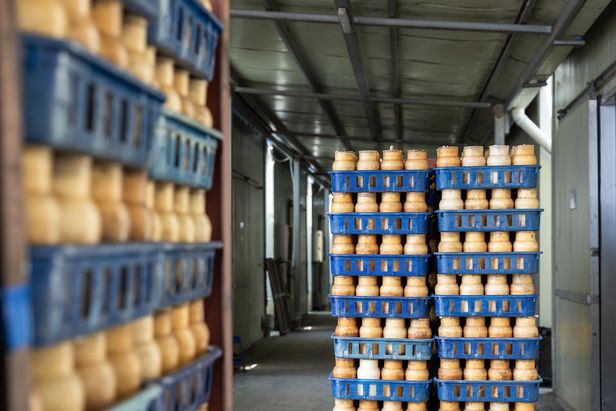 The wages Cambodian workers receive are more than 10 times the average in their home country. The average monthly salary in Cambodia is about 200,000 won, but this farm earns over 2 million won per month, including overtime pay. Just as miners and nurses working in Germany in the past earned foreign currency and sent it back to their home country, most of them said they would remit the money they earned to their families back home. Of the 12 Cambodians who are 'elite workers', only one will be able to continue working at the mushroom farm in the future. This is because only one person is allowed on this farm on an E-7 visa, which allows for a long-term stay beyond short-term employment of up to 10 years and to bring family. The Korean government is seeking to expand the employment system for foreigners, including E-7.
President Lee Jin-seong told Cambodian employees, “Use the money you earned in Korea to buy land near a new city being developed in Cambodia.” Instead of buying rural land near your hometown, buy urban land with high development potential. This was advice that came from my experience as a Korean who went through a process in a developing country. President Lee said he quit his job as a researcher in Seoul to farm with his father, returned to his hometown, and started a mushroom farm. I received a box of mushrooms as a gift and climbed into the driver's seat. The navigation showed that it was 2 hours away from Seoul. ‘Cambodia’ was closer than I thought. “There is a speed bump ahead,” the navigation system informed me. It was like a warning to be prepared as I returned to my daily life.
|
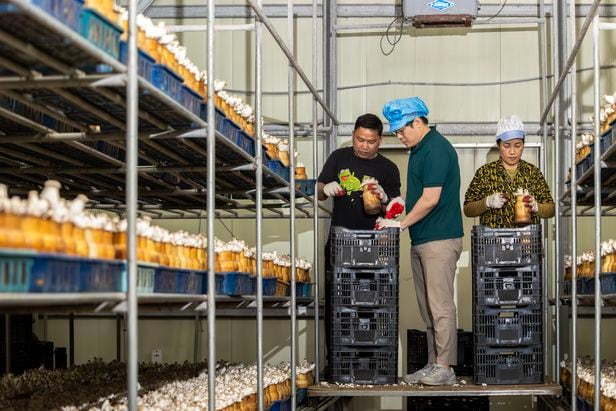
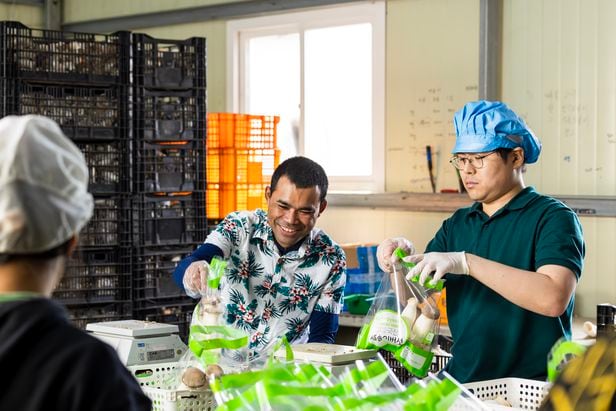
No comments:
Post a Comment